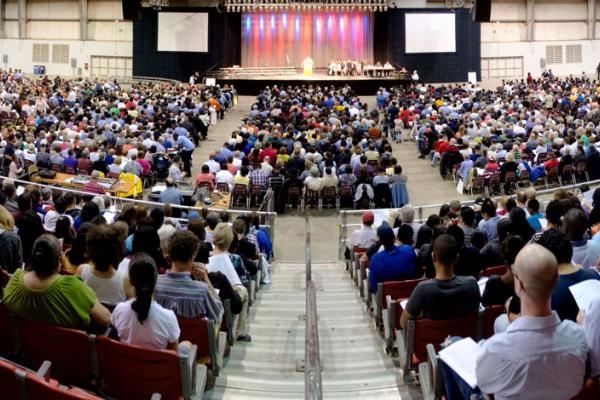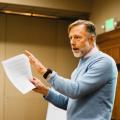"If the church does not recapture its prophetic zeal, it will become an irrelevant social club without moral or spiritual authority."
-Rev. Dr. Martin Luther King, Jr.
Sixty years ago, Dr. King challenged the church to reclaim its prophetic zeal. As Dr. King implied, prophetic zeal is not something new. It is ancient. The first call stories in scriptures are calls to pursue liberation and justice: Moses, Amos, Micah, Jeremiah. When God called Moses, it was because God had seen the oppression of the people and desired liberation:
"Then the Lord said, 'I have observed the misery of my people who are in Egypt; I have heard their cry on account of their taskmasters. Indeed, I know their sufferings, and I have come down to deliver them from the Egyptians, and to bring them up out of that land to a good and broad land, a land flowing with milk and honey, to the country of the Canaanites, the Hittites, the Amorites, the Perizzites, the Hivites, and the Jebusites. The cry of the Israelites has now come to me; I have also seen how the Egyptians oppress them. So come, I will send you to Pharaoh to bring my people, the Israelites, out of Egypt.'” (Exodus 3:7-10)
Likewise, Jesus, according to Luke’s Gospel, is also called to fight against oppression and fight for liberation.
"'The Spirit of the Lord is upon me, because he has anointed me to bring good news to the poor. He has sent me to proclaim release to the captives and recovery of sight to the blind, to let the oppressed go free, to proclaim the year of the Lord’s favor.' And he rolled up the scroll, gave it back to the attendant, and sat down. The eyes of all in the synagogue were fixed on him. Then he began to say to them, 'Today this scripture has been fulfilled in your hearing.'” (Luke 4:18-22)
We know that people of faith have been called for generations to maintain prophetic zeal. So what happened? It is not as if there is a lack of oppression and injustice. Mass incarceration, housing that is out of reach, huge and growing gaps in the education system, and the harassment of LGBTQ+ people are just some of the signs of oppression in our time.
If our religious traditions are rooted in the prophetic voice, what happened so that Martin Luther King worried that we had lost it? As someone who has worked in and with congregations for more than 35 years, the loss of the prophetic voice goes hand in glove with the individualistic focus of our culture. The Church in the United States has leaned into that individualistic ethic. Even though the Bible is written from the point of view of community, it is more often read as a personal guidebook. Whether the focus is on personal salvation or self-help or self-realization, the Church—both the evangelical and liberal wings—spends most of its time and energy on helping individuals, and rarely considers the systemic changes needed to bring about justice.
This individualist focus ignores the biblical reality in which our sacred texts were written. The Shema, for example, is addressed to the people (“Hear O Israel”) and frames the Torah’s instruction for how to live in community. Jesus prayed “Thy Kingdom Come”.
The individualistic focus also ignores our roots. Humans survived and thrived in communities. We evolved to be inherently social and relational beings. We find meaning and purpose in community and in our relationships with God and our neighbor.
The individualistic focus was made worse by the pandemic. Except for “essential workers,” people were isolated in their homes. We ordered food and groceries from home. We worshipped from our living rooms on Zoom or Facebook live. We watched George Floyd get murdered from our living rooms. While some people marched, most of us processed that event online or in solitude. The same things happened with the 2020 Presidential election and the events of January 6. At the very times when we needed to be in community, to hug one another, to see one another in three dimensions, our communities of faith were flat and two dimensional.
And yet, across the country, tens of thousands of people are fighting against individualism by standing together for systemic changes - for justice. In 28 cities from Kansas to Florida, tens of thousands of people of faith challenged public officials to implement proven solutions to serious community problems like affordable housing, homelessness, jail diversion and school suspensions. More than 600 congregations worked to reclaim their prophetic voice.
From March to May in 2022, twenty-eight community organizations gathered thousands of people in person for Nehemiah Actions. Those organizations began to emerge from the pandemic to stand up for justice. Those organizations won tens of millions of dollars for affordable housing. They won criminal justice reforms that are diverting people from the pipeline to prison. They pressed public officials to take steps to end homelessness.
In Lexington, Kentucky, for example, the BUILD Organization has won systemic changes to their housing policy. At the onset of the pandemic, Mayor Linda Gorton proposed a budget that slashed funding for affordable housing from $2 million a year to $200,000 citing the prospect of diminishing tax revenues from the pandemic (of course, golf courses and development projects were untouched). BUILD organized a car rally in May 2020 for several hundred cars in the parking lot of Mary Queen of the Holy Rosary Catholic Church and called on city council to reject the Mayor’s proposal to cut affordable housing. The Council did just that. In 2021 leading up to an outdoor Nehemiah Action, Mayor Gorton had learned a lesson and proposed to increase funding from $2 million to $3 million. The organization celebrated that increase and then got the Metro Council to allocate an additional $10 million from the American Rescue Plan allocation. In 2022, the Metro Council is taking steps to put $10 million annually into affordable housing from the City’s general revenue.
BUILD and the 27 other DART affiliates have been successful because they have been focused on building and deepening relationships. They have engaged diverse groups of people and helped them listen to each other and find common ground. Our experience in DART teaches us that there are plenty of people and congregations who want to be engaged in building relationships with each other and fighting together for justice. There is still a basic hunger for people to connect with each other.
Behind these thousands of people organizing to reclaim their prophetic voice are dozens of community organizers. These organizers do the hard work of listening, engaging, and following up. While our organizers come from many different backgrounds and faith traditions, they find inherent value and meaning in connecting with others.
Jacqueline Reyes, the Lead Organizer of the DART affiliate in St. Petersburg, FL, puts it this way:
“Growing up, my understanding of the hope of the gospel was that one day, we’d be happy in heaven. Being an organizer has taught me that the gospel is not just about the hope of heaven, but it is also about the hope that God can and does work through us to bring justice to our communities.”
And Shanae' Calhoun, the Lead Organizer of Topeka JUMP, the DART affiliate in Topeka, Kansas says: “As a follower of Christ, I am called to love my neighbor who I do not see everyday. The fight for justice is the only tool that I have to express that love. Being an organizer in the DART network for 13 years has been the only tool I have had access to live out the most honest and meaningful version of my faith.
If you or someone you love is angry about injustice, is frustrated by the increasing polarization in our culture, longs to connect with diverse people and be part of something larger than yourself, we invite you to consider a career as a community organizer with the DART Center. You can help to shape a different kind of future for the church, for local communities and for yourself.


